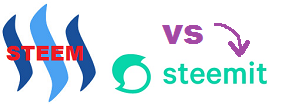I am going to try the impossible. To simplify some crypto terms for you.

There is so much going on, even I can get confused at all the bits and pieces of how this all works.
You keep hearing some common terms being thrown around, let me break a few of the most popular ones down for you.
These are simple terms. Not detailed descriptions. Enough to paint a picture in your mind.

BLOCKCHAIN
Imagine a file on your hard drive. The file gets bigger and bigger as more stuff gets added to it.
The great part is, everyone has a live copy of that same file, all of the time. So it is easy to read what is saved in that file.

STEEM vs STEEMIT
You are reading this text, which is saved on the steem blockchain.
- STEEMIT is like a blockchain reader
- BUSY.ORG is like a blockchain reader
- eSteem app is like a blockchain reader
...and all of those readers can "write" to the blockchain too

Centralized Crypto Exchange
It's like a stock market. Except there is no stocks. They are crypto coins (like Bitcoin, Litcoin) traded between people. The Exchange brings people all in one place and takes a small commission everytime someone BUYS or SELLS a coin
- Problem: You have to trust the proprietary operators and staff of the exchange, their rules, and their policies
Decentralized Crypto Exchange (DEX)
It's also like a stock market. Except there is no stocks. There are TOKENS that represent actual coins which gateway nodes bring in, or send back out based on those tokens.
- Benefit: You have to just trust the blockchain.

Bitshares
A decentralized exchange. It has a main token called BTS. When you buy or sell on this exchange, you pay nominal fees that are due in BTS. So to trade there, you have to hold and spend some BTS

Ethereum
Ethereum is a blockchain. So is steem.
STEEM is made up of "smart contracts" which says things like "if this user makes a post, and those people upvote it, the post is worth $XX dollars worth of STEEM or SBD"
Ethereum is made up of "smart contracts" too. Those contracts are different than STEEM contracts. Anyone can create a smart contract that does different things.

EOS
EOS is similar to Ethereum but a lot more scalable. It is multi-threaded (meaning it can concurrently do many things all at the same time)
https://en.wikipedia.org/wiki/Thread_(computing)
...so when Ethereum gets busy, everyone has to wait. When EOS gets busy, it just adds another thread
Think of Ethereum like a single-lane highway
Think of EOS like a multi-lane highway

Bitcoin
The first cryptocurrency that proved that people can trade virtual coins without knowing or trusting each other.
Many of the basic principles of Bitcoin are found in all technologies.
Bitcoin started with PUBLIC and PRIVATE keys.
A public key: Is like your bank account number. Anyone can deposit to it
A private key: Is like your bank PIN code. You need that to move money out of it

BitsharesTalk
A discord voice and text chat channel that meets every Saturday at 1pm UTC (9am Eastern)
This is where about 50 people show up to listen to 3 or 4 guest speakers talk about the Bitshares DEX
Why is this important even if you aren't into Bitshares?
The afterparty that ends after the main show is a free-for-all cryptocurrency discussion that allows people to talk about anything crypto-related to each other. You should be there!
See @officialfuzzy blog for more details on the next Bitshares hangout.
Thanks for sharing this . This deserves an upvote for your effort.
Nice, something my parents could probably understand.
My only note would be:
Is (STEEM is made up of "smart contracts") the best way to describe it though? STEEM is more of a straight-forward "list of transactions" than a contract, and not really "smart" by way of the definition of a "smart contract".
When you send to @null and it puts it on promoted tag on the main steemit site -- that is a smart contract, correct?
When you delegate your steem, by sending a transaction, that creates a contract too, right?
That's what I was thinking.. anyway. :)
hmm... possibly. That seems logical. I would need to dig a bit to get the technical answer on that.
Thanks for the information but I don't get what you mean by (it can concurrently do many things all at the same time) how can that be possible please I need to understand this point that
Most blockchains work in sequential fashion.
A block can contain many transactions, so it "appears" as if it is doing a lot of things at once.
..the problem is, when the block gets full, you have to WAIT until the next block can take transactions.
__
With EOS, it is multi-threaded, and can support sidechains. This means that multiple chains (like a multi-lane highway) can exist.
So there isn't just 1 block that gets full and you have to wait.
There's many blocks that can simultaneously take transactions and exit "off" the highway, and merge back on it again. Which stops waiting, and traffic jams.
It's pretty complex and detailed. These are just the overall simplistic descriptions I've created to try and paint a picture of the difference.
Hi @intelliguy really good way to explain this key point i mean simple words can help to understand easily and fast to the new investors or new followers of this technology i 'm going to resteem your post i have some followers that will appreciate it. Regards
yes you have a great post
A very clear break down into bitesized piece.
This wont get you fully aware if you are granny and reading the newspaper with this inside..but if you are already half eye lurking because crypto got your interest (and that is what we do, because you are on steemit), then is the perfect explanation!